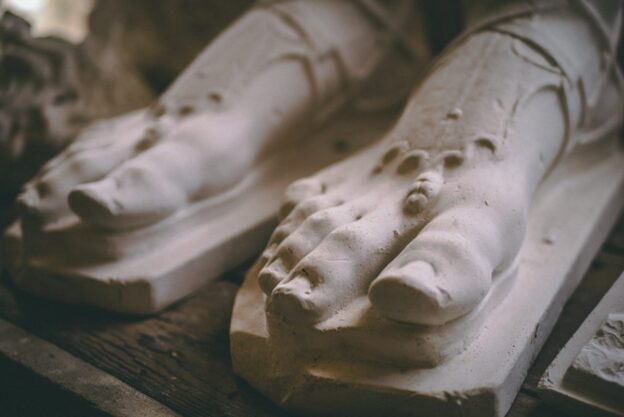Forty years ago, we could not have imagined paying $3 for a cup of coffee. Now, a daily Starbucks habit would cost you the price of a house over 30 years. And people pay it. Starbucks is nearly 43 years old. There are about 23,000 of them, but there are 1000 less of them this year. Starbucks is shrinking. Here’s a fun fact: Australians don’t like Starbucks. There were 84 stores in that country at one time. All of them have closed. And one day, that will happen in the states. Starbucks will go the way of Blockbuster and the A&P. I’m amazed at the regularity with which things come and go, things we assume are a bedrock part of our culture, that we used to think were worth waiting for. And I’m amazed at the amount of effort that goes into building things that eventually die.
Friends of mine were the developers of the Kroger shopping center in Evans. Every once in a while I remind Bill that I live five minutes from the store he built. The last time I reminded him of that, his wife, Phyllis said, “It s still there?” She then went on to say that most of the stores they built in the 70s and 80s are gone now. Can you imagine what that must feel like, to drive past something you poured heart and soul into, only to see it become irrelevant in your own lifetime?
One day, all the Starbucks stores will be gone. And all the Target stores and a lot of other things we thought would last forever.
And while all those things are dying, people will be hearing about Jesus. And one day, every person will have heard. Then, the end will come. Should that fact change how we live? Jesus says yes. In Matthew, chapters 24 and 25, he shows us three things we can all be doing while the world around us is changing: Wait. Watch. And work.*
WAIT
Jesus and his followers were walking away from the temple when he said, “One day, none of this will exist.” That blew their minds! How could the temple not exist? That’s where the presence of God was. That’s how they defined who they were. That’s what made them different from all the people who lived around them. This was the world as they knew it. How could the temple not be?
So they asked him,
Tell us, then, when will these things be and what will be the sign of your coming and of the end of the age? (24:3)
And Jesus said, “There will be so many things that look like its all coming to an end. There will be people who swear they have an inside track on the day the world comes to an end! Wars will break out! There will be huge natural disasters! Starbucks will die! And you will be tempted to believe you’re seeing the end coming, but those things you think are signs, aren’t. And those people you think have all the answers, don’t. That stuff they are predicting is child’s play. When it really happens, it will be intense and unmistakable.”
Then he said this:
Then you will be arrested, persecuted, and killed. You will be hated all over the world because you are my followers. And many will turn away from me and betray and hate each other. And many false prophets will appear and will deceive many people. Sin will be rampant everywhere, and the love of many will grow cold. But the one who endures to the end will be saved. And the Good News about the Kingdom will be preached throughout the whole world, so that all nations will hear it; and then the end will come. (24:9-14)
Here’s what I hear in what Jesus says here:
- Those who follow him will suffer. They will be misunderstood, which is a difficult kind of suffering.
- There will be a whole other group of people who simply lose interest, which is also a kind of suffering.
- And while that’s happening, the gospel will be proclaimed to all nations. The end will not come until that happens.
So what do we do until then? Jesus tells us “the one who endures to the end will be saved.” So one thing we have to do is endure. Hang in. Persevere. In other words, wait. He’s not talking here about a passive waiting, like in a waiting room, but the active kind that gets us ready. He’s talking about spiritual preparation. And in chapter 25, he tells a story to show us what that looks like. Its the story of the ten bridesmaids, who went to meet the bridegroom. (This was a cultural thing in Jesus’ day.) They had lamps and they were to meet him at the place of the big wedding party, but they had to wait. When the announcement came that he was finally on his way, half the bridesmaids realized they didn’t have enough oil in their lamps to last them. Five of them were prepared (they’d brought extra oil), but five of them were left feeling embarrassed while their lamps went out. So they ran off to get some more oil, but while they were gone, the bridegroom showed up and went with the five prepared bridesmaids to the party. And the door was locked and the other five were left outside. They banged on the door to be let in, but the bridegroom said, “Do I know you? I don’t think I know you.”
And Jesus ends that story by saying, “So stay alert. You have no idea when he might arrive.”
I remember a conversation with my Japanese supervisor when Steve and I lived in Japan many years ago. One day, I asked him what he believed about God, and his response was, “Japanese get religious when we die.”
According to Jesus, “when we die” is probably not the time to get started.
In this story, Jesus teaches us the difference between waiting ready and just waiting. Henri Nouwen says, “If we wait with the conviction that a seed has been planted and that something has already begun, it changes the way we wait. Active waiting implies being fully present to the moment with the conviction that something is happening where we are and that we want to be present to it. A waiting person is someone who is present to the moment, believing that this moment is the moment.”
You see this in how Jesus and Paul both talk about the end of time in the Bible. They talk about it as if it is going to happen at any moment, not because it was about to happen but because that mindset worked for them. It kept them awake to the spiritual realities at work all around them.
Nouwen says, “To wait with openness and trust is an enormously radical attitude toward life. It is choosing to hope that something is happening for us that is far beyond our own imaginings. It is giving up control over our future and letting God define our life. It is living with the conviction that God molds us in love, holds us in tenderness and moves us away from the sources of our fear.”
Jesus teaches us to wait and to watch.
WATCH
However, no one knows the day or hour when these things will happen, not even the angels in heaven or the Son himself. Only the Father knows….So you, too, must keep watch! For you don’t know what day your Lord is coming. Understand this: If a homeowner knew exactly when a burglar was coming, he would keep watch and not permit his house to be broken into. You also must be ready all the time, for the Son of Man will come when least expected.
Matthew 24:36, 42-44
Listen to what Jesus says here: No one knows. Stay awake. You don’t know when it is going to happen. Be ready. Stay awake. He is coming at an hour you don’t expect.
This message is equal parts, “stay awake”and “you don’t know when.” When he talks about staying awake, I think he’s talking about that kind of waiting that actively looks for where God is at work so we can join Jesus in his mission.
Jesus tells another story in Matthew 25:14-30. It is about a master who about to go on a trip. He calls his servants together and divides up his property among them. He gives one five talents (that was a first-century unit of money), and another one two talents and another one talent. The five-talent servant goes off and works hard and doubles his investment. The two-talent servant does the same. He works hard and doubles his investment. But the one-talent servant took his bit and buried it.
When the master came back and asked for an accounting, the five-talent guy was able to give him ten talents. The master was thrilled with this and said, “Well done, good and faithful servant. Because you have been faithful with a little, I will make you faithful with more.” Same thing with the two-talent servant. He was able to hand back four talents and the master said, “Well done.”
But the one-talent guy had no gain to show from what he’d been given. He even told the master he wasn’t particularly motivated because he thought the guy was mean. Wrong answer. Because he’d been unfaithful, the master took his one talent and gave it to the guy who had ten.
Kevin Myers takes this parable and makes a leadership application from it. He talked about the difference between the five-talent servant and the two-talent servant. He says five-talent leaders seem to live above the law of gravity. Things seem to come to them effortlessly. Most of us are not that guy. Most of us live under the law of gravity. In other words, Myers says, some people lead in leaps, but most people lead in layers.
Watching, then, becomes a matter of understanding where God is at work so you can join him, so you don’t end up burying what you’ve been given. Watching is about looking for where the glory is breaking through. We practice this in our community by sharing our glory sightings, so we’re exercising that habit of spiritual watching.
Jesus teaches us to wait (which is not a passive thing, but an active time of preparation). He teaches us to watch for where the glory is breaking through. And because he is so merciful, he also gives us permission to get out there and work.
WORK
But when the Son of Man comes in his glory, and all the angels with him, then he will sit upon his glorious throne. All the nations will be gathered in his presence, and he will separate the people as a shepherd separates the sheep from the goats. He will place the sheep at his right hand and the goats at his left. Then the King will say to those on his right, ‘Come, you who are blessed by my Father, inherit the Kingdom prepared for you from the creation of the world.
Matthew 25:31-34
What does it look like to inherit the Kingdom?
James is the guy in the Bible who talks about how something as small as a rudder can determine the direction of a whole boat. The rudder he’s talking about is the tongue, but I think the principle transfers.
For instance, our building has a loading dock in the back —in fact, a couple of them. When we first talked about this place as an option for a permanent location, I noticed that those who had that vision would often say things like, “That loading dock is who we are. We want this place to feel more like a working space than a sanctuary.” So that loading dock, which probably takes up about twenty square feet, has become a kind of rudder for us. It is affecting our direction. It’s driving us to serve Jesus radically, which I think Jesus would support.
Listen to what he said about how we’ll be judged at the end of time:
I was hungry and you gave me something to eat, I was thirsty and you gave me something to drink, I was a stranger and you invited me in, I needed clothes and you clothed me, I was sick and you looked after me, I was in prison and you came to visit me. Then the righteous will answer him, ‘Lord, when did we (do any of these things?)’ The King will reply, ‘Truly I tell you, whatever you did for one of the least of these brothers and sisters of mine, you did for me.’
Matthew 25:35-40
This is a radical thought. The people of Jesus’ day thought the end would look like some kind of political overthrow. But it ends up looking more like a normal person giving time and attention to someone in need. It looks like you, being particularly kind to someone who needs a sign of hope. It looks like middle schoolers painting someone’s house in Georgia. Or men framing doors for a woman who lost her home to a storm in North Carolina. Or teenagers washing the feet of homeless people at SafeHouse in Atlanta. Accepting someone where they are, giving them a free haircut on a Saturday in a warehouse in Evans, Georgia.
It looks a lot like the yard sale one of our members held the last two Saturdays. They put a bunch of things out on a table, none of which seemed to be worth much, and then they waited. And people came and things sold and at the end of two days, they’d raised $1700 for missions.
This is how it happens. One conversation at a time, one meal at a time, one prayer at a time, one bag of food at a time, one nail at a time, one kind word at a time in the name of Jesus. That’s how the Kingdom comes.
And Jesus says, “This is how the gospel of the Kingdom will be proclaimed through the whole world as a testimony to all nations, and then the end will come.”
Pray earnestly with me the prayer of Jesus as we wait, watch and work for the Kingdom to come:
Our Father who art in heaven, hallowed be your name. Your Kingdom Come, Your will be done, on earth as it is in heaven. Give us this day our daily bread and forgive us our trespasses as we forgive those who trespass against us. Lead us not into temptation but deliver us from evil for yours is the kingdom and the power and the glory forever. Amen.
*I want to thank David Platt for introducing me to those three words in his study on Matthew.



